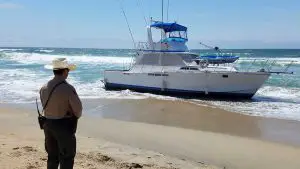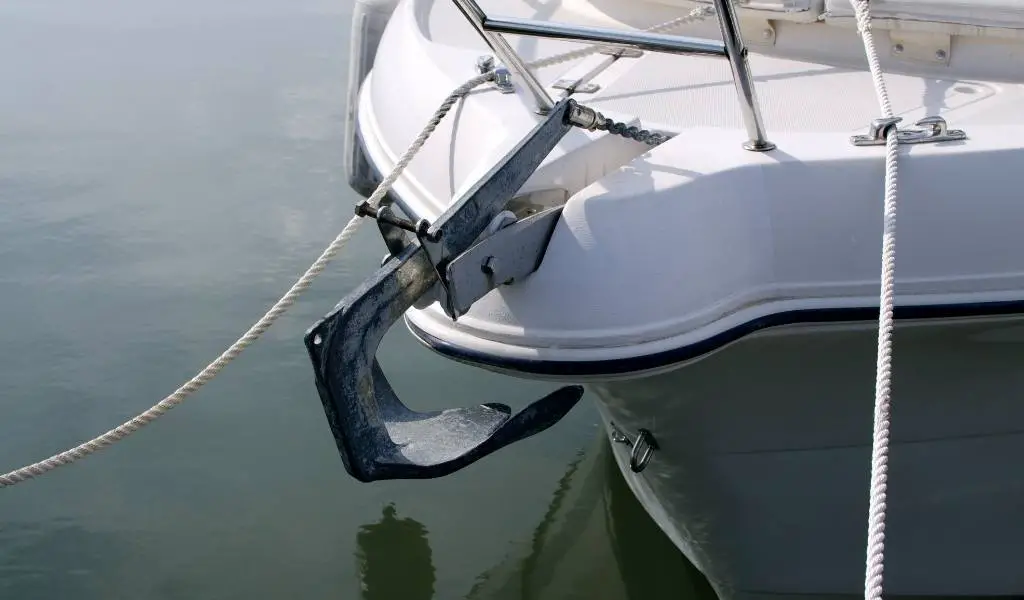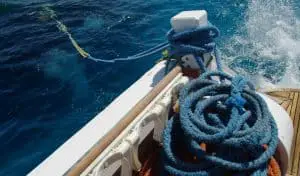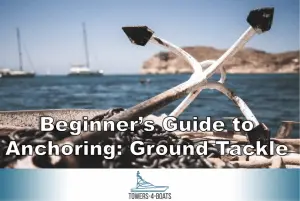Do I need an anchor for my boat? This is a question that many new boat owners often ask. Those with very little boating experience may often feel as though they do not need an anchor because they primarily drift or troll while out on the water. Some may think an anchor is unnecessary if they are using their boat for recreational purposes such as pulling people on inner tubes. After all, if you’re not stopping while you’re out on the water, there really isn’t a need for an anchor, is there?
The short answer is – you are not required by law to have an anchor on your boat. A few states require that you have some way to secure your boat, but they don’t specify that it must be an anchor. However, your anchor is a critical piece of safety equipment, and all experts say that you need an anchor regardless of what is legally required.
Anyone with boating experience understands the importance of being able to anchor yourself in the water whenever you find a great fishing spot or find yourself having mechanical difficulties. I often consider my anchor as an emergency brake that will allow me to stop my boat if I encounter a difficult situation.
If you want to learn how to anchor your boat, check out this article I wrote.
Does the U.S. Coast Guard Require Boats to Have Anchors?

The U.S. Coast Guard lists some required and recommended equipment for boats sailing on American waters. Some things included on their required equipment list are personal flotation devices such as life jackets, fire extinguishers, sound devices, and other safety equipment.
When it comes to anchors, the Coast Guard places them on the “recommended equipment” list. This is rather puzzling for some as a means of stopping your boat in an emergency should be a requirement. It becomes all the more unusual when you consider that you may never have to use personal flotation devices, sound devices, or any of the other items on the required list. However, the odds that you will eventually need to anchor your boat suddenly is actually very high.
Just because the Coast Guard does not require you to have an anchor does not mean one is not needed. Many boating experts agree that an anchor is indeed an essential piece of equipment, and advise people to have one on their vessel before going out on the water.
Personal Experience
Whenever people ask me whether or not they need an anchor for their boat, I always like to share a personal story. It happened a few years ago when I was fishing alone on a nearby river. My time on the water was almost up and I was headed back toward the dock with the day’s catch.
Suddenly and with no warning, my boat died. All at once I found myself floating out of control down the river. I was headed directly into several other boats that were anchored near the shoreline, and was on a collision course with no way to stop it.
Upon realizing that I would be unable to get my boat started, I immediately cast out my anchor. This allowed me to stop before I suffered a dangerous crash with any of the other boats. After working on my boat for a little while, I was eventually able to get it started again. I made it safely back to the dock, and was able to get my boat’s mechanical problem taken care of later at home.
This story might have had quite a different ending if I had not had an anchor on board with me. Until that day, I hadn’t really thought much about needing to use an anchor during an emergency. Now I look at it as an essential piece of equipment that I will never leave the dock without.
What are the Benefits of Having an Anchor on your Boat?
What are the benefits of having an anchor? If the U.S. Coast Guard doesn’t make it a requirement, is an anchor really all that important? These are questions boat owners often ask and you may be wondering about yourself. Despite the fact that anchors are not mandatory equipment, there are still numerous advantages to keeping one on board, namely safety. If you encounter bad weather, mechanical problems or other issues, you can use your anchor to keep yourself from crashing into other obstacles.
An anchor will also allow you to stop anywhere on the water. As such, if you find a great fishing spot you can “park” your boat and will not have to worry about continuously trolling your motor.
What are the Different Types of Anchors?
It’s not enough to have an anchor on board. Choosing the right one is equally important, so here is an overview of a few common types to help you decide:
- Bruce or Claw Anchors: These are ideal for a number of waterway bottoms, and are often used on small boats because they are easy to set. They will also hold well under high tide or heavy winds.
- Fisherman’s Anchors: This style contains one arm that is designed to penetrate the water’s bottom. A fisherman’s anchor is non-burying, and is therefore best suited for rocky bottoms.
- Plough Anchors: The name comes from the look and design of this anchor, which resembles a farmer’s plough. As with the fisherman’s anchor, they are ideal for waters with rocky bottoms.
- Fluke or Danforth Anchors: Known for their pointed flukes, they are used to dig into the ground. They are therefore ideal for muddy bottoms as well as grassy riverbanks.
When considering the type of anchor you need, think about the size of your boat, water depth, and type of bottom. Be sure your anchor is heavy enough to secure your boat and that you are familiar with how to use it. As long as you do these things, you will always be prepared in the event you do need an anchor.
The Takeaway
Anchors may not be mandatory equipment; however, smart boat owners will never go cruising without them. You may only need your anchor once, but when that occasion arises you will definitely be glad you had one. Don’t wait until you encounter an emergency to think about placing an anchor on your boat. Add one to your vessel right away to ensure you are prepared for any unexpected situation that may arise.




